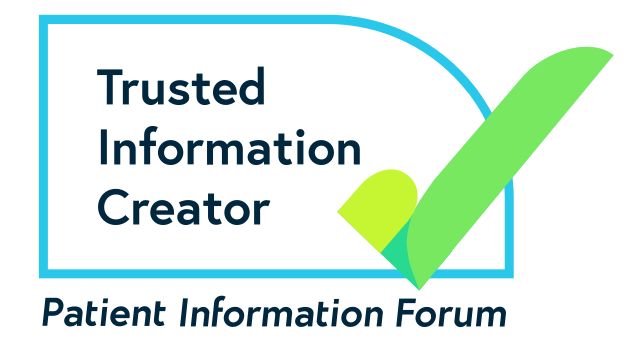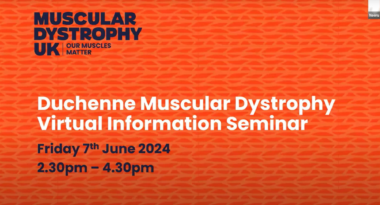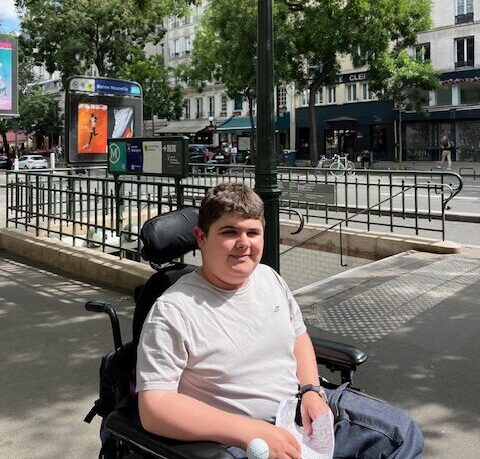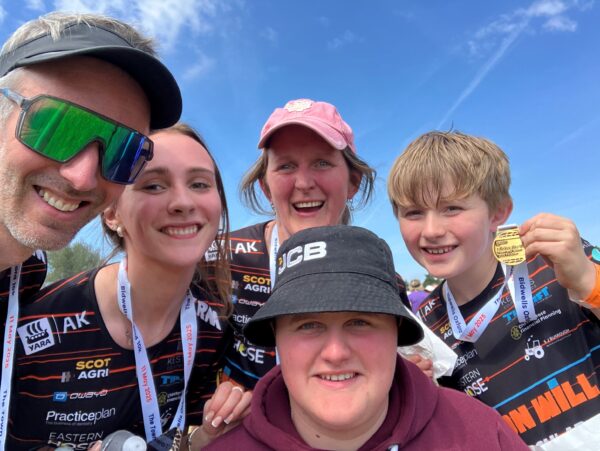Our condition-specific alert cards provide crucial information for emergency healthcare professionals treating patients with muscle wasting conditions.
Duchenne muscular dystrophy (DMD)
Duchenne muscular dystrophy (DMD) is a condition that causes progressive muscle weakness and wasting. It stops the body from making dystrophin, a protein needed for muscle strength and function. DMD mainly affects boys and typically starts in early childhood, and eventually leads to a loss of mobility. Over time, the condition also affects the heart and breathing muscles, which can cause life-threatening complications. Specialist care is needed at all stages.
While there is no cure for DMD, research is ongoing and new treatments are being developed. DMD shortens life expectancy but with improved medical care, more people are living into their 40s and 50s, and their quality of life is improving.
Muscle weakness is the most noticeable and early symptom of DMD, which worsens over time. As the condition progresses, it affects the heart, respiratory system, and other organs, including the gastrointestinal system, and leads to a wide range of challenges. Some people may also have learning difficulties, behavioural problems, and speech delays. This can create educational and social challenges that affect various parts of a child or young person’s life. For more information on how DMD affects different systems and how it’s managed, refer to the condition management section.
Muscle weakness
Muscle weakness usually starts in the pelvis, hips, and thigh muscles (proximal muscles) before spreading to the shoulders and upper arms. In early childhood, muscle weakness often shows up in difficulty climbing stairs, running, jumping, or getting up from the floor. Some children may have delays in sitting, standing, and walking. They might use a Gower’s manoeuvre (pushing up from the floor with their hands on their thighs) and have a waddling gait (walking on their toes with an arched lower back). Enlarged calf muscles (pseudohypertrophy) may also be noticeable.
As weakness progresses, children may find it harder to walk as far or fast as their peers, fall often, and need help with climbing stairs. Over time, walking may become increasingly difficult, and children may need a wheelchair from around the ages of eight to 11. At first, a wheelchair may only be needed for long distances but eventually, full-time use will be necessary. Increasing weakness can make it difficult to raise the arms above shoulder level, and fine motor skills such as writing and eating, may decline.
Steroids have significantly changed the natural course of DMD. When started early and at the time of diagnosis, steroids help to maintain muscle strength and function and can delay the progression of muscle weakness and the loss of the ability to walk.
Genetic changes
DMD is caused by a change in the dystrophin gene, which provides instructions to make the dystrophin protein. This protein helps maintain muscle structure and function. In DMD, the change means the body produces little to no dystrophin. As a result, muscle cells become damaged over time and are replaced by fat and fibrous tissue. In time, this causes progressive weakness in all skeletal muscles.
There are different types of DMD, known as variants or mutations, depending on the specific genetic change. Some variants may have different treatment options, but all types of DMD can be slowed with steroids, which are commonly used.
DMD is not like Becker muscular dystrophy (BMD), which is also caused by a change in the dystrophin gene but allows for some functional dystrophin to be produced, which results in milder symptoms and slower progression.
Inheritance
DMD is inherited in an X-linked recessive pattern, meaning the genetic change is on the X chromosome. Since the male sex has only one X chromosome and the female sex has two, males are typically more significantly affected by DMD, while females may be carriers. The condition can be inherited from a carrier mother, but it can also be caused by a new change in a child’s genes.
For more information, see our inheritance and genetics page.
Manifesting carriers
Affected males cannot pass the changed gene to male children, but all their female children will be carriers. Most female carriers don’t experience symptoms because they have a second X chromosome, from which the dystrophin protein can be produced. However, a small number of female carriers can have muscle weakness and some associated symptoms of DMD. This means they are a manifesting carrier of Duchenne muscular dystrophy.
DMD is often diagnosed around the age of three, when symptoms such as muscle weakness or difficulty with physical activities are noticed. A GP can refer a child to a specialist for assessment. The initial test is usually a blood test to check for raised creatine kinase (CK) levels – an enzyme released when muscles are damaged. The liver enzymes (ALT and AST) may also be raised, and this indicates muscle damage and breakdown, rather than liver problems.
If CK levels are high, genetic testing is done to confirm the diagnosis by identifying a change in the dystrophin gene. The genetic test is done through a simple blood test. A genetic diagnosis is important because it allows families to make informed decisions about prenatal testing in future pregnancies and offers genetic testing for other family members. It can also determine if a child qualifies for clinical trials. In rare cases, a muscle biopsy may be done if genetic testing is inconclusive, but this is becoming less common.
Genetic counselling and testing for other family members should be arranged soon after diagnosis and can be organised by a clinician or GP.
For more information, see our diagnosis page.
A multi-disciplinary approach is important in not only managing the condition and symptoms but in improving wellbeing too.
Access to a healthcare team
DMD needs a multi-disciplinary approach for effective management, which involves a team of specialists working together to address the wide range of symptoms caused by the condition. This team should lead care from the time of diagnosis and typically includes, but is not limited to, neurologists, physiotherapists, occupational therapists, and specialists in respiratory and cardiac care. As the condition progresses, older people with DMD may also require access to speech and language therapists, and nutrition teams for swallowing difficulties and weight management. If learning difficulties or behavioural issues arise, working with psychology and/or the local mental health teams is essential.
Steroids and treatments
Steroids have significantly changed the natural course of DMD for some children.
Corticosteroids, like prednisone or deflazacort, are commonly prescribed for DMD. These can help slow the progression of muscle weakness and maintain function for longer. However, these medications can cause side effects, including weight gain, delayed puberty, effects on bone health, and adrenal suppression, which require careful management and regular monitoring by a healthcare team. Vamorolone, a newer corticosteroid, is recommended for those aged four and older because of its ability to slow progression of muscle weakness and its reduced steroid-related side effects.
New treatments, such as Translarna (ataluren), are available for specific genetic changes known as ‘nonsense mutations’ and may slow disease progression. Access to Translarna varies in different parts of the country and it can be harder to access in some parts than others. Ongoing research is focused on developing more treatments that target the underlying cause of DMD. We play a key role in the appraisals of new treatments. For more information, see our access to treatments page.
Exercise and physiotherapy
Physiotherapy is important for people with DMD and should focus on maintaining range of movement (ROM), muscle strength, and overall function. A specialist physiotherapist can create a personalised programme that includes stretching, strengthening, and mobility exercises to help maintain independence as much as possible. This programme will need to be reviewed and amended regularly as physical abilities change over time. To maintain function and address any concerns quickly, close communication with community healthcare providers is important.
Physiotherapy for those with DMD can be divided into three main stages. Each stage requires specific targeted physiotherapy to ensure function and health are maintained.
- Young ambulant: Treatment should focus on stretching exercises to maintain movement, with particular focus on the calves. Early use of stretching splints or contracture correction devices (CCDs) is recommended. The exercise programme should focus on exercises to help maintain or improve muscle endurance and strength. Inclusion and participation in physical education (PE) at school, as much as safely possible, is also important for social inclusion with peers.
- Transition stage from ambulant to wheelchair user: Treatment should continue to focus on stretching the lower limbs and maintaining ROM, especially in the calves, using splints and/or CCDs. At this stage, consider a standing frame to help reduce the risk of contractures and to allow opportunities for standing. The exercise programme should emphasise aerobic exercise. Some light resistance exercise would also be recommended.
- Non-ambulant: For those who are full-time wheelchair users, targeted stretches should be included, focusing on both lower and upper limbs. The use of ankle-foot orthoses (AFOs) is recommended when in a wheelchair to help maintain foot position and help with seating posture. Activity or exercise should be aerobic in nature but may also include some light resistance work – especially for the upper limbs.
Children and adults may need support and education on how to perform stretches and exercise, as well as encouragement from caregivers to perform physiotherapy safely and regularly. High-impact or high-resistance exercises should be avoided, as these can harm the muscles. It’s also important to take regular rest breaks to prevent fatigue. Hydrotherapy can benefit all three stages and should be part of the exercise programme, although access to hydrotherapy is difficult.
Cardiac management
DMD affects the heart, leading to cardiomyopathy (heart disease) in all people over time. This weakens the heart’s ability to pump blood around the body. The age which this starts and becomes detectable can vary and there are often no symptoms until it becomes advanced. Regular heart monitoring should begin at diagnosis, even if there are no heart symptoms. Heart function should be assessed using tests such as electrocardiograms (ECG), echocardiograms (ECHO), or cardiac MRIs.
When necessary, treatments such as ACE inhibitors or beta blockers will be prescribed to manage heart health. It’s recommended to start treatment by age 10 at the latest. People taking steroids should be monitored for potential side effects, including high blood pressure and high cholesterol.
People with DMD may also have cardiac arrhythmias, where the heart beats irregularly. Symptoms may include palpitations, dizziness, or fainting. To help detect arrhythmias that may not be apparent during a regular check-up, 24-hour Holter monitoring, over a full day, is often used to track these irregularities.
Respiratory management
As a person with DMD gets older, their respiratory muscles may weaken, so regular monitoring is essential. Respiratory function can be assessed both at home and in clinic. The respiratory muscles are important for coughing, which clears mucus from the airways and lungs. This is especially important during chest infections, which people with DMD are more likely to get. Antibiotics should be given quickly if an infection happens. When coughing becomes less effective, methods to improve the clearance of respiratory secretions may be considered. Devices such as a lung volume recruitment (LVR) bag or cough assist machine can help clear mucus to reduce chest infections.
Overnight sleep studies are also needed to check breathing during sleep, especially if there are signs like disrupted sleep, morning headaches, or extreme daytime tiredness. As breathing difficulties develop, non-invasive ventilation (NIV) will be recommended at night. Specialist support is required for training and use of the machine. In cases of advanced respiratory weakness, ventilation support may also be needed during the daytime. Early monitoring and timely provision of respiratory support, such as NIV, can help avoid emergencies and the need for hospital stays.
Vaccinations against common causes of respiratory infections are strongly recommended to reduce the risk of serious illness. Current vaccinations recommended for those at risk of respiratory infections include flu (annually) and pneumococcal, and consideration of respiratory syncytial virus (RSV) in those at very high risk.
Endocrine management
The endocrine system is a network of glands that produce hormones (chemical messengers). These hormones help control growth, puberty, bone health, blood sugar levels, and how the body responds to stress. People with DMD have a higher risk of hormone-related problems. This is because of long-term glucocorticoid steroid treatment and progressive muscle weakness. Complications include poor growth, obesity and related issues such as glucose intolerance and abnormal levels of fats in the body (dyslipidaemia), delayed puberty, and adrenal insufficiency. An endocrinologist is a hormone specialist who can help monitor and manage these changes to support healthy development.
Growth and progression of puberty should be regularly monitored. Delayed puberty is common in those treated with steroids and should be discussed with families and young people around the ages of 10 to 11. A doctor with experience in assessing stages of puberty should assess all children aged 12 or older. Boys who show no signs of puberty should be referred to an endocrinologist to discuss testosterone replacement, ideally before they turn 14. Testosterone can be given in doses that increase over time to induce puberty and support with physical and emotional development. It also supports bone health. Before starting treatment, expected benefits and possible side effects should be discussed with an endocrinologist. Growth, puberty, and any side effects will be regularly monitored through clinical examination – and blood tests if necessary.
Steroid use can affect the adrenal glands, which help the body respond to stress, regulate blood pressure, and manage blood sugar. This can lead to adrenal insufficiency, where the body can’t respond to stress properly. Stress, acute illness or stopping steroids suddenly can cause an adrenal crisis, which is life-threatening. All people on steroid treatment should be assumed to have adrenal insufficiency and are therefore at risk of an adrenal crisis during sudden illness or significant stress (e.g. surgery or bisphosphonate infusion).
All families and young people with DMD should be taught about the signs and symptoms, and management, of an adrenal crisis. Everyone taking steroids should have a written emergency steroid plan. This should include instructions, such as the sickness dosing of steroid to be followed during sudden illness. It’s important to speak to a specialist about how to manage these risks and ensure proper care. It’s strongly recommended that people with DMD wear a medical alert bracelet and carry a Steroid Emergency Card. The card can be obtained from a GP, community pharmacy, or specialist hospital team.
Bone health management
Muscle weakness and long-term steroid use can weaken bones, making them more fragile and therefore increasing the risk of fractures. Yearly screening with spine X-rays and DXA scans for bone mineral density is recommended for everyone. Getting enough calcium and vitamin D is also important for bone health, and all people with DMD should be prescribed a vitamin D supplement. A yearly blood test is recommended to monitor vitamin D levels, aiming to maintain a healthy range.
People with a history of low trauma, long bone fractures or spine fractures (with or without back pain) should see a specialist to discuss treatments that help protect bones. These treatments and medications, such as bisphosphonates, help by slowing the breakdown process of bones and promote better rebuilding. This helps keep bones stronger and less likely to break.
Orthopaedic management
Orthopaedic management focuses on managing and preventing issues with the bones and joints. People with DMD will develop tight muscles and joints (contractures), which can affect movement. Treatments like regular stretching exercises and the use of devices, such as ankle-foot orthoses (AFOs), splints, or braces, are used to manage joint stiffness. These can be custom-made. As mobility becomes more challenging, the use of powered wheelchairs and special seating can support good posture and movement. In some cases, surgery may be considered to improve joint movement, especially in areas like the feet or ankles, where the Achilles tendon often tightens and shortens and can be released by a simple procedure. A team of healthcare professionals, including orthopaedic surgeons and physiotherapists, should work together to create a plan that helps people maintain independence and mobility. Orthopaedic surgeons focus on surgical treatments to improve joint function, while physiotherapists help with exercises and mobility aids to improve movement and flexibility.
Scoliosis (curvature of the spine) is very common in people with DMD not being treated with steroids. Steroid use may delay the development of scoliosis but does not prevent it entirely. Regular assessment of the spine is necessary. Scoliosis surgery is a procedure that may be considered by the spinal team. This procedure helps improve posture, pain management, and also helps make breathing easier.
Long bone fractures can greatly affect mobility, making it harder to walk. If a fracture occurs, it’s important to consult the neuromuscular team for treatment decisions. Surgery may be needed to allow for quicker recovery and to regain mobility. The team should guide both the treatment of fractures and rehabilitation.
Fat embolism syndrome (FES) is a serious risk after a long bone fracture, where fat from the bone enters the bloodstream, potentially blocking oxygen to the lungs. Symptoms of FES include confusion, rapid breathing, and shortness of breath. If any of these occur following a fracture or injury, seek emergency medical attention and inform the staff about possible fat embolism.
Gastrointestinal and nutritional management
People with DMD often experience digestive and nutritional issues, mainly caused by weak muscles involved in digestion and swallowing. Recognising and treating these problems early is important.
Constipation is common, and bowel habits should be discussed with specialists. It may feel embarrassing, but often much can be done to improve things. Constipation is where you have changes to how you poo – including not pooing as often or finding it hard to poo. Weakened muscles in the digestive system can slow the movement of food through the intestines. This can result in infrequent urges to go to the toilet, discomfort, and dry, hard poo. Delayed stomach emptying (gastroparesis) is also common and happens when the stomach takes longer to empty its contents. This can cause abdominal discomfort after eating, nausea, vomiting, and loss of appetite. Sometimes, people may feel full after eating only a small amount. It’s important to manage digestive issues early with treatments like laxatives and dietary changes to prevent complications, such as abdominal pain and haemorrhoids. A dietitian can help create a balanced eating plan, including supplements, to ensure enough fibre, fluids, and key nutrients, like calcium and vitamin D, while avoiding problems like weight gain or malnutrition. A physiotherapist can suggest safe exercises to help with digestion and prevent constipation.
Swallowing difficulties (dysphagia) are another concern, as the muscles in the throat become weaker, making it harder to swallow food. This can lead to food feeling “stuck in the throat” or entering the lungs, which can cause aspiration pneumonia (lung infection). Mealtimes may take longer, and there may be drooling, coughing, or choking. When swallowing becomes difficult, a person may eat less, which can lead to dehydration and poor nutrition. It’s important to watch for these signs and work with a speech and language therapist to ensure safe swallowing. Jaw weakness can also cause tiredness when chewing. In some cases, a feeding tube may be necessary to help with nutrition and to maintain a healthy weight. This should be discussed in detail with the specialist team. Heartburn and ‘reflux’ are common in people with DMD, and most people will respond to the use of specific drugs called proton pump inhibitors (PPIs) for this.
If severe pain develops, especially with worsening constipation or vomiting, it’s important to seek urgent assessment. There are rare complications that are best managed urgently.
Psychological management
Living with DMD can be challenging, and emotional and psychological support is essential for people with DMD and their families. Mood should be discussed at neuromuscular appointments. Issues such as difficulty with social interactions, anxiety, mood swings, and emotional adjustment can happen at any stage of life. Major changes, like adjusting to new treatment plans or moving from paediatric to adult care, can be especially difficult.
Cognitive and learning difficulties usually develop earlier in childhood. Conditions like autism, attention deficit hyperactivity disorder (ADHD), and obsessive compulsive disorder (OCD) can be more common in people with DMD. This is thought to be because the dystrophin protein also supports brain function. Steroids are an important treatment for DMD and help to maintain muscle strength, though they can cause mood changes in some children. Any observed changes should be discussed with neuromuscular clinicians, as they can make changes to the treatment plan. It’s important to note that not everyone with DMD experiences cognitive issues.
As physical limitations due to muscle weakness develop, children and young adults may experience emotional difficulties, such as depression and social isolation. It’s important that all emotional, behavioural and cognitive difficulties are identified early and addressed with appropriate support. Tailored education, health, and care plans (EHCPs) can support children and young adults in education to reach their full potential. Referrals to behavioural health clinicians, social workers, counsellors, clinical psychologists, and palliative care specialists may be needed for ongoing support. Medication may be required in some cases.

Author: Muscular Dystrophy UK
Reviewers: Prof Tracey Willis, Dr Maria Elena Farrugia, Nick Emery, Dr Kostas Savvatis, Dr Patrick Murphy, Dr Harshini Katugampola, Prof Anton Emmanuel, and Dr Linda Bouquillon
Last reviewed: March 2025
Next review due: March 2028
Duchenne muscular dystrophy webinar (2024)
On Friday 7 June 2024 we held a webinar on Duchenne muscular dystrophy. Watch to learn about the latest research, as well as tips and advice on living well with Duchenne muscular dystrophy.

We are here for you
Webinars, Information Days, and support groups for our muscle wasting community. Our life-changing support is here for you.
Advice for living with or caring for someone with a muscle wasting condition.


